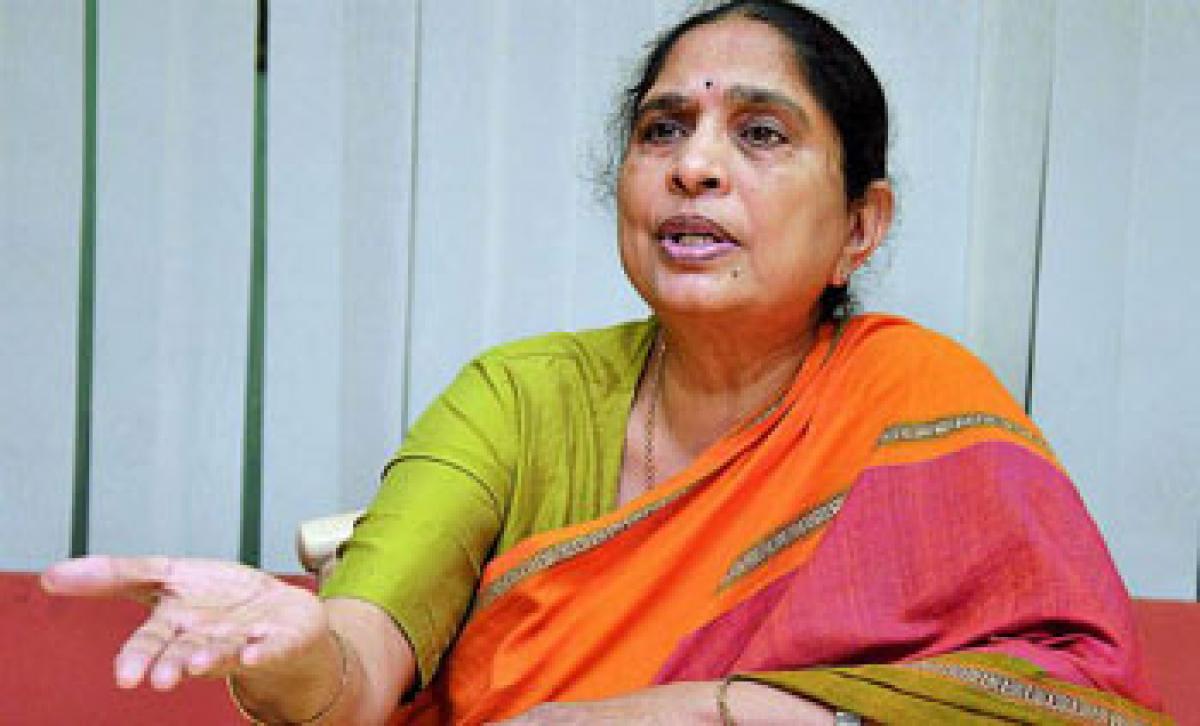Live
- Two Russian oil tankers with 29 on board damaged due to bad weather
- Telangana's Traditions Will Be Protected, Village by Village : BRS Leader MLC K. Kavitha
- Uganda to relocate 5,000 households from landslide-prone areas in eastern region
- Harish Rao Criticizes CM Revanth Reddy: "His Time is Over"
- Vijay Sethupathi Hails 'Vidudala-2' as a Theatrical Game-Changer
- Sahaj Yog: A Path to Inner Transformation and Harmony City takes giant strides
- Allu Arjun meets his uncle Nagababu at his residence
- J&K L-G felicitates Langar organisations & NGOs for contribution during Amarnath Yatra
- Hit by Covid, MP's Rakesh Mishra sees revival of his fortunes, courtesy PM SVANidhi scheme
- Trailblazing Yakshagana Artiste Leelavathi Baipaditthaya No More
Just In

Child rights activist and Ramon Magsaysay awardee Prof Shantha Sinha said it was “absolutely absurd” to say that returning State awards, as a show of dissent in the ongoing debate over intolerance in the country, was “a paid propaganda”.
 VOICE OF DISSENT
VOICE OF DISSENT
Hyderabad: Child rights activist and Ramon Magsaysay awardee Prof Shantha Sinha said it was “absolutely absurd” to say that returning State awards, as a show of dissent in the ongoing debate over intolerance in the country, was “a paid propaganda”.
“I am as worried as most in the country on the issue that there is polarisation that is happening through national discourse, especially going against the very mettle of the Indian Constitution - diversity,” Sinha told to a news agency in an interview.
The University of Hyderabad professor added it was “absolutely absurd to say that people are returning awards because it’s a paid propaganda”.
Though she did not name anyone, her comment was obviously a retort to Union Ministers VK Singh and Arun Jaitley, who trashed both the debate on intolerance and the return of awards by artists and intellectuals.
Earlier, Minister of State for External Affairs VK Singh told reporters that particular debate on intolerance was not a debate. It was the unnecessary creation of very imaginative minds who were being paid with a lot of money.
“Those returning awards are playing politics by other means. Follow their tweets and their stances on various social and political issues. You will find a lot of rabid anti-BJP elements in them,” Union Finance Minister Arun Jaitley told reporters on October 29.
“I had already called it a manufactured rebellion. I stand by my phrase. And I think, the events as they are unfolding only indicate that kind of manufacturing is going on at faster speed,” Jaitley said when asked about artists returning awards in protest against growing “intolerance”.
Stoutly defending the artists and intellectuals, Sinha said returning awards was a form of protest and a way of making a statement that one was against what was happening in the country. She added that it was a way of creating consensus in the country in favour of a secular India.
“Due to the present kind of politics, there is no mature understanding of our society,” she said. Sinha, who served as the first chairperson of the National Commission for Protection of Child Rights (NCPCR) for two consecutive terms, was also honoured with the civilian honour, Padma Shri.
Asked if she would return her awards, Sinha answered in the negative, saying the awards were for the “idea that children should not be allowed to work, and not for me alone”.
The anti-child labour activist remarked that the amendments mooted by the current government to the Child Labour (Prohibition and Regulation) Act, which allow children below 14 years of age to work in “family enterprises” or entertainment industry, were “extremely disappointing”. She said it “reinforces invisiblisation of child labour”.
The professor added that it was the State's responsibility to ensure a child gets all the support he or she needs so as to go to school and not to open him or her to a greater exploitation.
“Need of the hour is to make a separate ministry for children, considering we have 420 million children in the country, out of which at least a 50 per cent are school dropouts,” the activist said.
Sinha also expressed opposition to the move to lower the legally defined age of a “juvenile” as an adult for purposes of trial in heinous crime. In the December 2012 Nirbhaya rape case, it was the “failure of the State to give guidance to the child”, she said.
Expressing discontent with Minister for Women and Child Development Maneka Gandhi's move to allow the Juvenile Justice Board to decide whether a child had reformed or not, Sinha said, “It is against the very mettle of juvenile justice system, which is to help a child reform and give him/her a second chance at life.”

© 2024 Hyderabad Media House Limited/The Hans India. All rights reserved. Powered by hocalwire.com







